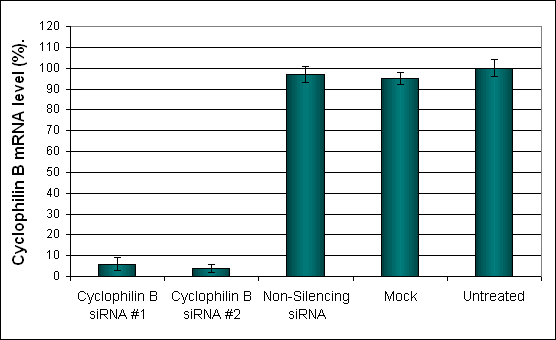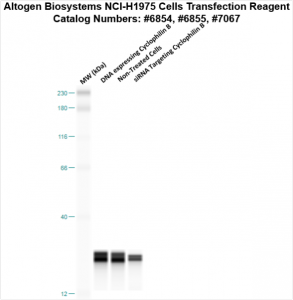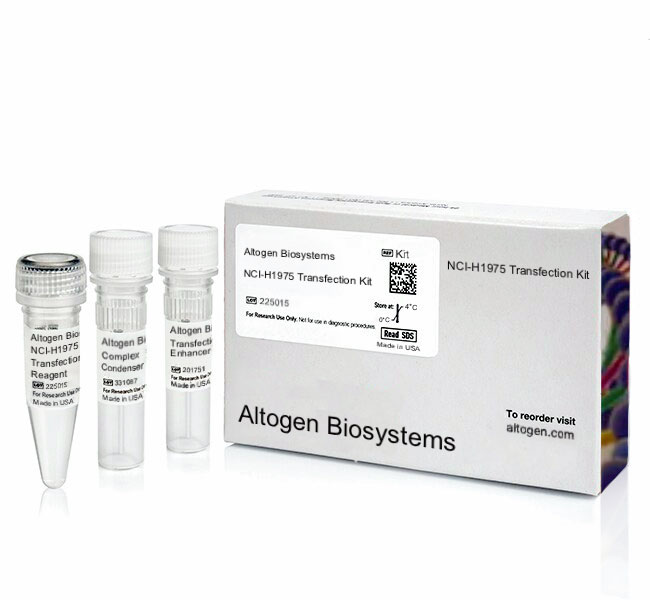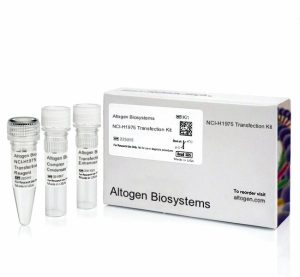Description
Purchase Orders: Click “Add to Cart” button to order, then email PO to orders@altogen.com.
Product Availability: In Stock.
Transfection Reagent for NCI-H1975 Cells (Lung Adenocarcinoma Cells, CRL-5908)
- Proprietary cationic lipids formulation
-
High transfection efficiency of small RNA (siRNA, shRNA, miRNA), mRNA, pDNA
-
Effective and robust cellular delivery
-
A proven reagent for establishing stable cell lines
-
Download in vitro NCI-H1975 transfection protocol: [PDF]
- Download PowerPoint presentation for NCI-H1975 cells transfection kit: [PPT]
- Download NCI-H1975 CRISPR/Cas9 transfection protocol: [PDF]
-
Developed and manufactured by Altogen Biosystems
Transfection Efficiency:
Reagent exhibits at least 94% transfection efficiency of siRNA delivery. Transfection efficiency was determined by qRT-PCR.
Product Description:
Enhanced transfection kit designed for superior efficiency in the NCI-H1975 cell line, an in vitro model lung cancer.
Transfection Protocol and SDS:
Download Altogen Biosystems NCI-H1975 Transfection Protocol: [PDF]
Download SDS: [PDF]
NCI-H1975 Cell Line:
NCI-H1975 is a human non-small cell lung cancer cell line that was originally derived from a patient with adenocarcinoma of the lung. This cell line is widely used as a model for studying the biology of lung cancer and developing new therapies for the disease. NCI-H1975 cells are characterized by the presence of two important genetic mutations that are frequently found in lung cancer: the epidermal growth factor receptor (EGFR) mutation and the T790M mutation. These mutations make NCI-H1975 cells particularly useful for studying the mechanisms of drug resistance in lung cancer and developing new therapies that can overcome this resistance. Researchers have used NCI-H1975 cells to study various aspects of lung cancer biology, including the mechanisms of drug resistance to EGFR inhibitors, the role of the T790M mutation in cancer development and drug resistance, and the efficacy of novel targeted therapies. This cell line has also been used in preclinical studies to test the efficacy of combination therapies that target multiple pathways involved in cancer growth and progression.
Although lung cancer therapeutics have evolved dramatically within last two decades, lung cancer is considered the primary cause of cancer deaths globally in both men and women. Non-small-cell lung cancers comprise approximately 80% of all lung cancer incidences and include adenocarcinomas, squamous cell carcinomas as well as large cell carcinomas. Non-small cell lung cancer is frequently diagnosed at advanced stages, with the average 5-year survival rate of only 16%. New approaches in lung cancer therapy are crucial in treating advanced-stage patients. The NCI-H1975 epithelial cell line was isolated in 1988 from lung cells taken from a non-smoker female with adenocarcinoma. NCI-H1975 is useful in investigative and analytical studies of new lung cancer drugs. Altogen Biosystems provides high-efficiency transfection reagent kits for the NCI-H1975 cell line.
Cell line mutations:
| TP53 | 7157 | 37 | 17 | 7577120 | 7577120 | Missense_Mutation | SNP | C | T |
| PIK3CA | 5290 | 37 | 3 | 178917478 | 178917478 | Splice_Site | SNP | G | A |
| EGFR | 1956 | 37 | 7 | 55259515 | 55259515 | Missense_Mutation | SNP | T | G |
| KLK8 | 11202 | 37 | 19 | 51499377 | 51499377 | Missense_Mutation | SNP | C | T |
| OR2T27 | 403239 | 37 | 1 | 248813821 | 248813821 | Missense_Mutation | SNP | C | T |
| CDKN2A | 1029 | 37 | 9 | 21971153 | 21971153 | Nonsense_Mutation | SNP | C | A |
| TTN | 7273 | 37 | 2 | 179411904 | 179411904 | Missense_Mutation | SNP | G | A |
| ERN2 | 10595 | 37 | 16 | 23711986 | 23711986 | Missense_Mutation | SNP | G | C |
| EMR3 | 84658 | 37 | 19 | 14748918 | 14748918 | Splice_Site | SNP | G | A |
| MAP2 | 4133 | 37 | 2 | 210560646 | 210560646 | Missense_Mutation | SNP | G | A |
| COL12A1 | 1303 | 37 | 6 | 75844499 | 75844499 | Missense_Mutation | SNP | C | T |
Data:

Figure 1. Cyclophilin B silencing efficiency was determined by qRT-PCR in the NCI-H1975 cells transfected by Cyclophilin B siRNA or non-silencing siRNA control following the recommended transfection protocol. Cyclophilin mRNA expression levels were measured 48 hours post-transfection. 18S rRNA levels were used to normalize the Cyclophilin B data. Values are normalized to untreated sample. Data are presented as means ± SD (n=6).

Figure 2. Protein expression of Cyclophilin B in NCI-H1975 cells. DNA plasmid expressing Cyclophilin B or siRNA targeting Cyclophilin B were transfected into NCI-H1975 cells following Altogen Biosystems transfection protocol. At 72 hours post-transfection the cells were analyzed by Western Blot for protein expression levels (normalized by total protein, 10 µg of total protein loaded per each well). Untreated cells used as a negative control.
Altogen Biosystems is a life sciences company that offers cell type-specific and pre-optimized transfection products, elecroporation kits, and in vivo delivery reagents. Advanced formulation of reagents and optimized transfection protocols provide efficient intracellular delivery of protein, DNA, mRNA, shRNA and siRNA molecules. Read more about transfection technology at Altogen’s Transfection Resource. Altogen Labs provides safety and efficacy preclinical research services. GLP-compliant studies for IND applications, and drug development, including over 90 in-house validated xenograft models, safety toxicology, etc (visit AltogenLabs.com).
Volume Options:
- 0.5 ml (Catalog #6854)
- 1.5 ml (Catalog #6855)
- 1.5 ml CRISPR (Catalog #2177)
- 8.0 ml (Catalog #7067)
Purchase Orders: Click “Add to Cart” button to order, then email PO to orders@altogen.com.
Product Availability: In Stock.






